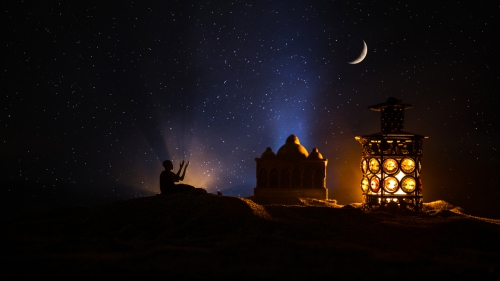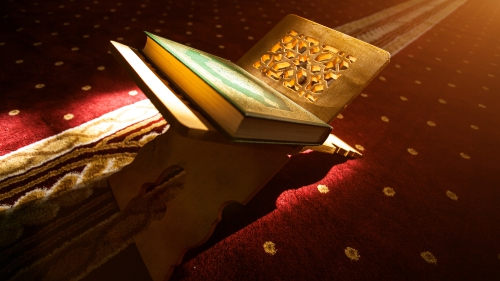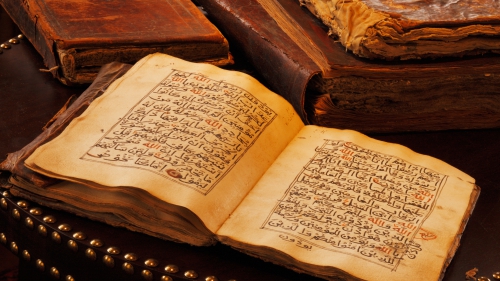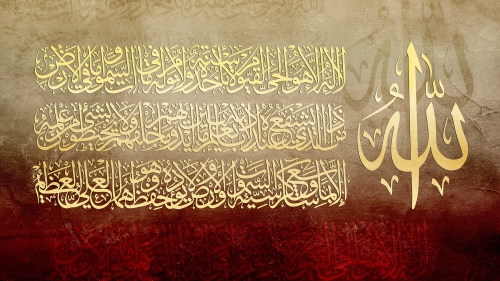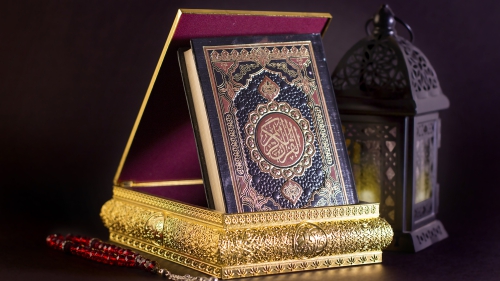To study or not to study the Quran!

As Muslim women, most of us have, at one time or another, participated in Qur'anic study circles. Some of these circles organize around readings of surahs (Chapters) or sets of contiguous verses. Others may be topical or thematic, where the members reflect upon a number of verses all dealing with the same subject. Larger Qur'anic discussion groups sometimes break into smaller groups that come together to share their insights at the end. But, whatever the format, these study groups come together for a noble purpose: to establish a personal connection with the Words of Allah, the highly glorified One, to reflect upon them and to allow their meanings to imprint themselves upon our hearts and minds.
In study groups everywhere, however, inevitably someone raises one particular objection--an objection that contradicts the role of the Qur'an as our living revelation and negates the role it plays in the lives of Muslims. This objection, stated simply, is that it is wrong for ordinary Muslims to reflect directly upon the Qur'an or to try to use their God-given faculties to meditate upon its meanings without the guidance of a traditionally trained scholar to tell them the correct interpretation. These pious and cautious brothers and sisters say the most we can do in the absence of such a qualified teacher is limit our understanding to that which is delineated in the classical commentaries.
This objection causes some consternation. It is not that having classically trained scholars in our midst is not a tremendous resource, or that the tafsir (detailed commentary of the Quran) should not be consulted--or even that an in-depth knowledge of classical Arabic is not important. On the contrary, the learned members of our community and the books they have written are a blessing and a treasure for us. In fact, it is important to use these resources in order to continually verify the legitimacy of our interpretations. We should always maintain humility and an awareness of our individual limitations when approaching the Book of Allah, and we should move forward with caution when contemplating its meanings.
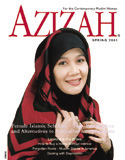 |
| 50% Off Click Here to Subscribe to Azizah |
Does this mean, though, that we should never spend time with the Book on our own, reading and studying its verses and becoming intimate with its content so that it may become a true companion to us? This is the underlying message of the objection, and it ultimately has the effect of erecting a barrier between Muslims and our scripture. This position suggests that the Qur'an is a very complicated and inaccessible scripture. It contends that our native God-given faculties--no matter how sincerely applied--are likely to deceive us, as is our experience of the world around us. As a result, it implies that only a few people have the privilege of seeking to comprehend Allah's revelation for themselves; the rest of the ummah (Muslim-community) should refrain from attempting comprehension, for their efforts will likely lead them into error.
This perspective, however, seems to go against much of what Allah's own words, found in the Qur'an, say about the Qur'an. In the ayat of the Holy Book itself, Allah does not present the Revelation as complicated and inaccessible, or as incomprehensible to all except those who have gone through a rigorous institutional learning. There is not even the implication that the ordinary believer need not or should not personally apply herself to its understanding due to a likelihood of getting confused or misled. What is more, the Creator of our faculties does not describe those faculties--the senses, potential for faith and reasoning--as illusory and prone to misapprehending the ayat. There is little indication that the Qur'an is meant to be for only the few to contemplate and that most of the ummah should refrain from deriving meaning from it--there is no "reflective privilege," so to speak.
So then, we need to ask, what does the Qur'an say about its own nature and purpose? How does Allah say that we are to relate to the Book? Where lies correct knowledge of the meaning of the divine message, and how may it be attained? Probably one of the foremost adjectives used in the Qur'an to describe it is "clear." The ayat are numerous: "...These are the verses of the Book, of a clear Qur'an" (Quran 15:1); "These are the verses of the clear Book" (Quran 26:2 and 28:2); "These are the verses of the Qur'an, of a clear Book" (Quran 27:1); "...Indeed, this is nothing but a Remembrance and a clear Qur'an" (Quran 36:69). The key message here seems to be evident: that the Qur'an is a lucid, straightforward and transparent book--sent down by our Lord with the intention that we shall be able to easily comprehend its meanings and be led aright by it. In case there is any remaining doubt as to the Qur'an's clear nature, Allah tells us that it is made free of crookedness, free of twists and turns that may throw us off: "Praise be to Allah Who sent down upon His servant the Book, and who did not make in it any twistedness, (but rather) straightforward ..." (Quran 18:1-2).
In Arabic, the adjective translated as "clear" is mubeen, which means "clear" in two ways: first, having clarity in and of itself (that is, being easy to perceive, such as a clear view on a sunny day, or the clear difference between a black dot and its white background); and, second, clarifying or explicating, such as a clarifying description of an event or a clarifying instruction after a vague one. The difference is subtle yet important, for Allah describes the Qur'an as both clear and as clarifying, as itself straightforward to understand and as clarifying that which may be obscure. The implication, it seems, is that Allah has created humanity in such a way that humanity will be able to understand Allah's Book and will also be able to use its light to illuminate truth in other aspects of our lives. This, in essence, is the transcendental truth of the Qur'an: that its meanings are available to all, and that its correct understanding is not limited to any sort of elite group defined by historical period, specialized training or language ability.
In his commentary on Surah Al'Imran, Ayah 7, the classical exegete of the Qur'an az Zamakhshari says that even when the meaning of a verse is not immediately clear, it is only a way for Allah to stimulate the faithful to further apply their faculties toward its clarification. In this way, he says, apparent obstacles to understanding are actually part of Allah's plan to encourage "research and meditation through reflection and inference." As translated in the book The Qur'an and Its Exegesis, az Zamakhshari eloquently describes the process of coming to clarity: "If the believer is firmly convinced that no disagreement or contradiction can exist in God's words, and he then notices something that in outward appearance seems to be a contradiction, and then he zealously seeks some means by which he can bring it into harmony...and he reflects upon it, coming to an insight about himself and other things and being inspired by God, and (in this manner) he acquires a clear perception of the harmony which exists between...verses, then his certainty regarding the contents of his conviction and the intensity of his certitude increase." This is the transcendence of Allah's truth--its potential perceptibility and clarity to the most learned woman and the most simple man, to the traditionally trained scholar as well as to the novice.
The grasping of this truth functions via two channels, as indicated in the Qur'an itself. First, we have our native human faculties--the senses, the potential for faith, and the faculties of reason-- given to us by our Maker. Second, we have the guidance that Allah gives to whom Allah wills. Looking at the channel of our natural human faculties, we easily see that Allah distributes these capabilities to virtually all of humanity in roughly equal measure; they are part of our fitrah. Are these faculties reliable channels to perception and comprehension of Allah's ayat? Or are they, as those who discourage independent examination of the Qur'an fear, more often a means to delusion and error, with the consequence that despite the intended clarity of Allah's ayat we should still avoid utilizing our faculties to comprehend them?
There are many ways in which these faculties are referred to in the Qur'an. One of the most direct verses about the physical faculties is in Surah al-Balad, in which Allah describes the path of righteousness: "Have not We made for [the human being] two eyes, and a tongue with two lips...?" (Quran 90:8-9). Not only sight, but also hearing is given as an intrinsically good and reliable means of knowledge to that path: "Indeed, the meanest of creatures according to Allah is the deaf and the mute (of mind and heart)..."(Quran 8:22). In other words, if we were truly to look around ourselves, to look and listen to the world and our experiences of it, we would perceive truth. Allah also states clearly that our faculties, our physical senses along with our innate sense--the intuition of the heart--have been created by Allah in all people: "And He created for you hearing and sight and the heart, that you may give thanks" (Quran 16:78); "And it is He who brought forth for you hearing and sight and the heart..." (Quran 23:78). These verses indicate that our senses are from Allah and are to be used to gain understanding about the ayat of Allah, which includes both those that are part of the Book and also those ayat that are "in the earth... and in our own selves" (Quran 51:20-1).
Two of the verses above also refer to the heart, and this is the second faculty that Allah has given to all human beings as an instrument by which we may perceive the true meaning of the Revelation. It is sincerity of faith, more than linguistic ability or specialized training, which gives people access to the meanings of the Qur'an. The organ of faith is the heart. That faith resides in the heart is established by a number of ayat: "...But Allah has made faith beloved to you, and has beautified [faith] within your hearts..." (Quran 49:7), and "Those who have faith and whose hearts find tranquility in the remembrance of Allah" (Quran 13:28). The sensitivity of the faithful heart is seen in the reaction to the Qur'an itself: "The skins of those who fear their Lord tremble upon [hearing] it, and then their skins and their hearts incline to the remembrance of Allah" (Quran 39:23, and see also 8:2 for similar verses).
Those who have the faculty of faith may also then attain true knowledge of the Qur'an, if Allah wills it. Allah states the connection between faith and specific understanding of the Qur'an, saying, "Nay! they are clear verses, in the bosoms of those who have been given knowledge" (Quran 29:49). A more specific linking between faith and true knowledge is given in the following ayat: "Indeed we have elucidated the signs (ayat) for people who have certainty [of faith]"(Quran 2:118); "In it are signs (ayat) for a people who have faith" (Quran 6:99); "In the alternation of night and day... are signs (ayat) for a people who have taqwa " (Quran 10:6). In fact, Allah reprimands those who do not exercise and apply the instrument of the heart in attempting to comprehend the Book: "Do they not reflect upon the Qur'an? Or are there locks upon their hearts?" (Quran 47:24).
A third faculty that Allah has given to humanity in order to gain insight into truth is not necessarily the most important, for it is best if it works in tandem with faith. However, it is probably the most controversial: this is the faculty of the mind, or reason.
The objection to applying independent reason in the absence of a teacher runs along the following lines: True understanding of the Qur'an is highly unlikely through reasoned analysis, because the reason of a lay person is highly unreliable, even one of generally of sound faith and mind. Therefore, we must only depend upon those interpretations that come through traditional channels; we must avoid personally contemplating the meaning of the Qur'an, or trusting what may seem to us a reasonable interpretation.
And yet, we find many verses of the Qur'an that encourage us to use our minds to ponder the ayat (Signs) of Allah, ayat both in the Qur'an and in the world around us: "Indeed, in the skies and the earth...are signs for people who reason" (Quran 2:164); "Most surely in the creation of the skies and the earth...are signs for people who understand, those who remember Allah...and who ponder the creation..." (Quran 3:190-1); "Thus does Allah clarify for you the verses, so that you may think" (Quran 2:219); and finally, "Do they not ponder the Qur'an?" (Quran 47:24). Indeed, such ayat are too numerous to cite them all here. It is as if Allah is saying that the ayat of the Qur'an are meant to be studied and contemplated; that it is precisely for such application that Allah created the faculty of reason in human beings. In fact, the Qur'an reprimands us for reciting Revelation without heeding or understanding its meaning (Quran 4:43, 62:5).
How can we not use our minds to interpret the Qur'an, when rational reflection is part of our human nature, when clarity is a foremost attribute of the Qur'an and when the entire language of Revelation assumes a reciter who comprehends? In support of this idea that all Muslims are encouraged to reflect independently on the Qur'an, is a tradition about Zaid bin Thabit, the blessed companion who was charged by Abu Bakr(r) to collect the written materials of the Qur'an after the death of the Prophet(s), and one of the handful of the companions who had memorized the entire Qur'an during the lifetime of the Prophet. He was asked his opinion about reading through the whole Qur'an in seven days. He responded that he preferred to take more time, so that he could pause and reflect upon it as he recited (Muwatta, 15.3.4).
It certainly seems that Allah conveys in the Qur'an a message about our relationship to the Qur'an that is somewhat different from the objectors' perspective. The Qur'an is a Revelation from Allah, Who has made it so that it will be clear to those who approach it with sincere utilization of their natural faculties of body (sensory evidence), heart (faith), and mind (reason). There is one more critical aspect, however: the guidance which Allah gives to whomever Allah wills. We all say, upon the expression of any aspiration or intention, "Insha' Allah," or, "If Allah wills." We say this out of recognition and belief that whatever one intends or aspires to do, it is Allah who fulfills that intention or aspiration. So it goes for insight into the divine truth: our human understanding is always limited, and "we have nothing of knowledge except that which Allah teaches us" (Quran 2:32). Verse after verse emphasizes this: "Now there has come to you people from Allah a light and a clear book; Allah guides by it whosoever follows His good pleasure...by His will, and He leads them to an upright path" (Quran 5:15-6); "Then upon Us is [the Qur'an's] clarification" and "guidance" (Quran 75:19 and 92:12); "That is the guidance of Allah, by which He guides whom He pleases of His servants" (6:88). This guidance of Allah is the framework within which all knowledge and insight into Allah's signs occur, and is the key component --assisted by perception, faith and reason--which makes truth accessible to people.
Those who discourage sincere believers from developing a personal relationship with the Qur'an or from reading and studying it in order to develop insight into truth, believe that the minds and hearts of the believers are not in themselves reliable instruments for apprehending the signs of Allah, and that therefore we should only rely on knowledge that has been transmitted over the centuries from our predecessors in the religion (may Allah be pleased with them all). We should not deny the great insights achieved by those who went before. Indeed, we should approach them for traditional learning whenever possible. Perhaps, though, based on the wealth of ayat cited above, we should not limit our conception of "true knowledge" of the Qur'an to that which lies outside of us alone. Rather, the verses above indicate that Allah creates true knowledge directly in the hearts and minds of the believers, through meditation over Allah's signs--Qur'anic and otherwise. So let us trust in Allah's guidance and in the faculties Allah created in us, and feel confident that if we bring our bodies, hearts and minds to contemplate the magnificent verses of Allah's Book, then, insha'Allah, we will be granted the true knowledge after which we seek.
Source Azizah Magazine - A unique publication that presents the issues, accomplishments and the interests of Muslim women in North America.
50% discount for IslamiCity Members.
To subscribe Click Here
Topics: Iman (Faith And Belief), Quran
Views: 13806
Related Suggestions
The Qur'an can be understood if you have a good command of ancient Arabic and its grammar. Of course, the history and context of the verses should also be studied in order to understand the message of the Qur'an. The verses the sister has mentioned are for the people who were present when the Qur'an was sent down through the prophet.
Most of us do not know Arabic, furthermore the Qur'anic kind, how can we understand the meaning of something when we are relying on a language that has far less vocabulary then the ancient Arabic, when we do not know the context of when the verse was sent and what did the prophet say about the verse. All this will take a great deal of study.
If we do what this sister thinks is right then the Qur'an would have lost its meaning a long time ago. That is how the previous messages from Allah got lost, by the interpretation of individuals from different parts of the world. They read the message through the prism of their cultures and pagan religions and consequently polluted the message for later generations; that is why it is important to have strict rules on who can teach Islam, only qualified people who took the time and effort to learn the sciences that explain the message.
Reading a translation of the Qur'an is good, and trying to understand is also good, but one should not let themselves think he or she is able to independently know the meanings of the Qu'an without the proper guidance from those who are trained.
One extreme is to say that none should ponder over any part Quran but the most learned scholars. The other extreme is to say that all should freely ponder any part of the Quran according to their their understanding. Both extremes are incorrect. This article is closer to the later, which is unfortunate for all who would be misled by its copious quranic quotations and repeated appeals to the readers' emotions and feelings of self-worth.
For a more balanced understanding of the types of interactions different sorts of Muslim may rightly have with the Quran, you can benefit from the following resources:
For free download: Respecting the Sacred Sources of Knowledge--http://www.qurannetwork.org/tajweedfolder/audio/Misc%20Audio/Shaikh%20Abu%20Yusuf%20Riyadul%20Haq/
Or buy the mp3 audio download of "The Need to Avoid Opinion on the Qur'an" from http://www.alkawtharacademy.org/store/dl_viewProduct.php?product=%20AKATG-MP3-0028
Studying the Glorious Quran: Principals and Methodology by Shaikh Abul Hasan Ali Nadwi (rahimahullaah) http://islamicbookstore-com.stores.yahoo.net/b7624.html
May Allah ta'aalaa increase us all in guidance.
out and well written article. I too, have felt frustration in study
circles at the insistence of the leader to only reflect on the words of
the Quran in the context of the tafsir. We weren't allowed to give
our own 'uneducated comments.' Insha-Allah, the article will help
to broaden the scope of how we may relate to Quran during study
sessions. Salam.
Just have to say that i am for study circles and it is definitely a more beneficial way to have sisters bond than pretending that they are at a club dancing the night away til fajr time...However these study are harmful if they are done not looking at opinions of the Prophet and traditional scholars. These were the learned ppl. Idontlike going to circles where everyone is interpreting the quran ayah on their with no daleel or evidence. otherwise, it is VERY easy to misinterpret things..we can be intimate with the Quran on our own we do not need others to do that. But i really think that circle should be informative and help you clearly understand an issue. So if ppl with lack of hadith, arabic language and scholarly knowledge are heading these circles...i dont know if that is safe. You do not need a scholar in your gatherings, but one must definitely researchtheir material withthe right sources before saying or heading a study circle.
This article has emotional tone and mixing both kinds of readers in my opinion that is a mistake.
As-Salaam-alai-kum,
As you have so candidly pointed out there are no
restrictions by Allah that prohibits a Believer from "pondering' upon the Quran. The Quran is the most comprehensive book to have been sent down to mankind. It is therfore, imperative that we study and reflect upon its meaning despite what the schloars may say.
It has taken me eight years to study the Quran.
It is the most fascinating book I have ever come across!
May Allah bless you.
Farhad.
in my opinion ... we have high obligation to Quran .... its words of ALLAh .. ALLAH is talking to us directly ... we have to learn Quran , try to understand .. it and teach it to others ...bring people to he understanding of What ALLAH (THE GOD )wants from humans .. reasons for the creation ... etcand many more questions that keep our minds burning .. will be cleared bwhen we read, study Quran from authentic sources isnahallah
remember me in prayers
ur sister
May Allah (swt) guide us to read and study with fresh and pure hearts! Ameen.
I agree with the insights of Noor and the rest and also with the points addressed by the author.
Consultation is also necessary in some cases and there are a lot of factors that affect on how people understand or should understand the Holy Qur'an, its a case to case basis. Some may be in alignment with the right path/correct understanding while some may still be deficient in some areas.
We should encourage people to think clearly and most importantly listen, as sometimes some may misinterpret the purpose of consultation. I remember once a taxi driver on my way to work somewhere in Malaysia complaining to me why the government requires people to consult first Ulamas when studying the Holy Qur'an, he utterred: "Isn't it that the Holy Qur'an should be easily understood? So why should we consult..." Its a good thing though that he is in an Islamic country cause if he was not some things may never be rectified...
Shukran to All,
JK
1. regarding period of iddat after the death of husband he said ''both husband or wife should observe the period of iddat'' and mourn after the death of his/her spouse. when i objected and even said that a husband can take a second wife when the first one is still alive and there is no iddat for a husband. the phd. insisted on his explanation because the english translation says ''they should wait'' and he took that as husband or wife, which is very misleading. and the prophet muhammad has warned that people who give their own judgement about quranic verses will be severely punished. the phd thinks he is phd in every subject. actually he has no knowledge of islam. that is why the quranic study groups are dangerous. innocent people will be misled.
2. the phd said there were four persons in the juma prayer. actually there was one man and six ladies. he says six ladies eual three men according to quran. and he is wrong. two ladies equal one man as a 'witness' not for juma prayer.
that is why very good knowledge of islam is required before we interprete quranic verses. the phd was misleading the whole group week after week. and the group was very satisfied because the 'the mufassir' is a phd.... or md or some other doctor or engineer for that matter...
such groups and mistakes are active all over usa.
finally, remember that lady who leads congregational prayers as imam and stupid men and women follow her. that is a product of similar self education and becoming an islamic mujtahid.
again group discussions and quranic studies without a scholar can be very misleading and there fore dangerous as far as islam and iman is concerned. reading translations and thinking is ok but interpreting wrong and misleading may take one to hell.
..three generations of muslims after hijra.
Sometimes i use to fear that there will be a time when we will find everybody following his/her desires (interpretations) in the deen, but i'm only conforted by the saying of our noble and beloved prophet (SAW) that:
This ilm (deen) will be carried by the trustworthy ones of EACH GENERATION. NEGATING from it the tahreef (alterations) of the ones going beyond bounds, the false assumptions of the liars, and the ta'weel (false interpretations) of the IGNORANT. (the emphasis are mine). Sadaqa rasulul-Allah sallal-Allahu 'alaihi wa sallam.
May Allah continue to protect the muslims and help us fight the evil of shirk and innovations in this beautiful deen of ours, Ameen.
I look at this lengthy and well written piece concerning the Qur'an and no mention of the prophet Muhammad (SAW) (but for the slight reference) in it. What the article says, in my understanding is that islam is Lai'laha illa-Allah, period. The second part of Muhammadul-rasulul-Allah (of equal importance to the first for compelete aqidah) seems to have been negated, delibrate or ortherwise?
The Qur'an was sent down to the noble prophet (SAW) and commanded to TEACH us (the ordinary) the contents and also for us to gain of his (the prophet (SAW)) wisdom as bestowed on him by Allah.
The prophet (as part of that wisdom) clearly indicated in some ahadith that we learn our Qur'an from two sahabas, i.e Abdullah ibn Abbas and Abdullah ibn Masud (Radiyallahu 'anhuma). The prophet also indicated the importance of copying him and the Sahabas in every facets of islam when he indicated that the path that he and his Sahabas are on is the only path leading to Allah. He equally said:
The best of people are my generation then those who come after them, then those who come after them, then there will come a people in whom there will be no good. Reported by at-Tabaraanee from Ibn Mas'ood.
Now the above three generations pondered and used the Qur'an, wrote and left manuscripts of their writings on this blessed deen. But cos of our insatiations we still are requesting from those (weaklings) that the prophet never mentioned to give us other interprtations (using the corrupted minds of the 20th and 21st century) of the Qur'an. Yes it is true that Allah has admonish us to read and ponder the text of the Qur'an, but as i said at the beginning, He equally Has asked us to follow the prophet in TOTO. So what do we do?
In my opinion when u want ponder the Qur'an bring an authentic interpretation near u, so that u compare notes, in this way u don't risk going out of the interpretations of the prophet (SAW) and those that he trusted amongst the
And We have indeed made the Qur'an easy to understand and remember: then is there any that will receive admonition? (Quraan 54:17,22,32,40)







